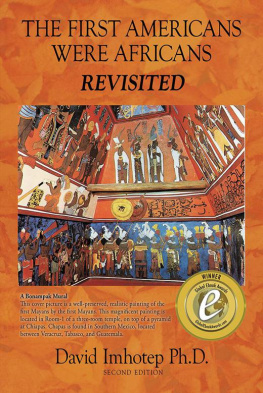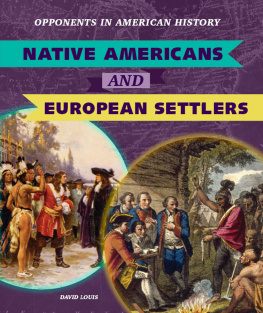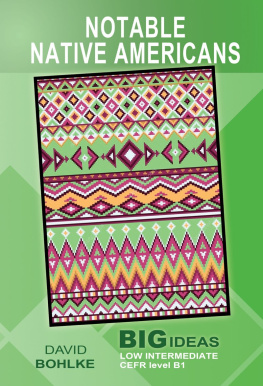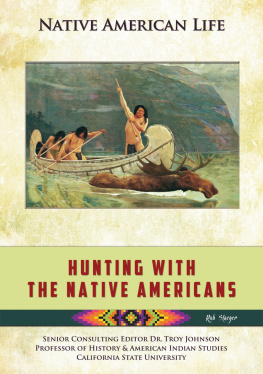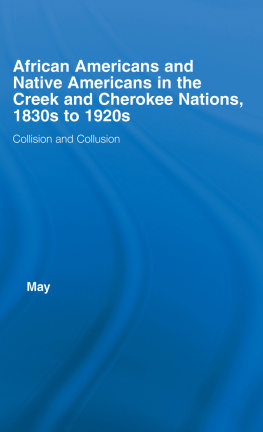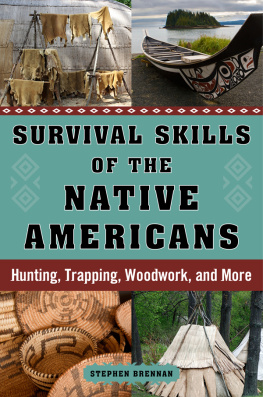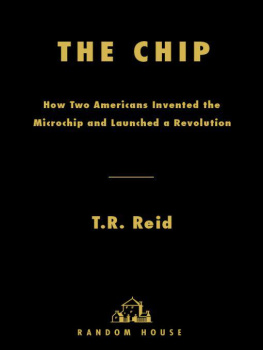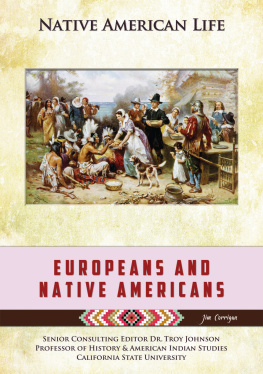First Illinois paperback edition, 1993
1993 by the Board of Trustees of the University of Illinois
Manufactured in the United States of America
P 13 12 11 10 9

This book is printed on acid-free paper.
Library of Congress Cataloging-in-Publication Data
Forbes, Jack D.
Africans and Native Americans : the language of race and the evolution of Red-Black peoples / Jack D. Forbes.2nd ed.
p. cm.
Rev. ed. of: Black Africans and Native Americans. Oxford and New York: Basil Blackwell, 1988.
Includes bibliographical references (p. ) and index.
ISBN 0-252-06321-X (pb) / ISBN 978-0-252-06321-3
1. IndiansMixed descent. 2. MiscegenationAmerica. 3. AfroAmericansRelations with Indians. I. Forbes, Jack D. Black Africans and Native Americans. II. Title.
[E59.M66F67 1993]
CIP
Acknowledgements
I wish to thank the faculty and staff of the Erasmus Universiteit Rotterdam for honoring me with the Tinbergen Chair for 19834 and for graciously assisting me in my work. Similarly, I wish to thank the faculty and staff of the Institute of Social Anthropology, Oxford University, for welcoming me as a Visiting Scholar during 19867 and for helping in many significant ways. Some of the early chapters were also prepared while I was a Fulbright Visiting Professor in Comparative American Studies at the University of Warwick or in the United States (at the University of California, Davis).
I wish to thank individually Dr P. G. Rivire of the Institute of Social Anthropology for his scholarly assistance and Sally Sutton for her typing. At Erasmus University I wish to thank the staff in the Juridische Faculteit who have assisted me with typing Joke Martins, Marion Ammerlaan and Ada Verschoor, and Dean Professor Dr D. J. Rijnov and Wim de Jong of the Faculteit for providing research assistance. Paula Heady and Carole Hinkle of Applied Behavioral Science and Nancy McLaughlin and Janet Kendrick of Anthropology, University of California, Davis, also should be mentioned for typing part of the manuscript. Finally I wish to thank A. S. C. A. Muijen for her research assistance and Dr Donald C. Cutter for his valuable help.
I wish to acknowledge that portions of this work have appeared previously in the Journal of Ethnic Studies, vol. 10 (1982), pp. 4666 (The Evolution of the Mulatto Concept); in the same journal, vol. 12 (1984), pp. 1761 (Mulattos and People of Color); in the American Indian Quarterly , vol. 7 (1983), pp. 5783 (Mustees, Half Breeds and Zambos ); and in Explorations in Ethnic Studies , vol. 7 (1984), pp. 1123 (The Use of the Terms Negro and Black ).
It is my desire to dedicate this study to Professor L. H. C. Hulsman of the Erasmus Universiteit Rotterdam.
Jack D. Forbes
Introduction
Thousands of volumes have been written about the historical and social relations existing between Europeans and the Native Peoples of the Americas and between Europeans and Africans, but relations between Native Americans and Africans have been sadly neglected. The entire AfroNative American cultural exchange and contact experience is a fascinating and significant subject, but one largely obscured by a focus upon European activity and European colonial relations with peripheral subject peoples.
Africans and Americans must now be studied together without their relations always having to be obscured by the separations established through the work of scholars focusing essentially upon some aspect of European expansion and colonialism.
It is especially important to note here, at the very beginning of this study, that those relations do not begin only in the Americas. On the contrary, they also take place in Europe and in Africa and perhaps also in the Pacific.
Contacts in Europe can be seen as significant because both the African and Native American ancestry there has tended to be absorbed into the general European society, and whatever earlier cultural developments have occurred have now become part of modern European culture. The impact of non-European peoples upon European societies directly within Europe has not, as of yet, been fully explored; and, of course, there is now a large new group of Native Americans and people of African background in Europe.
Contacts in the Americas have been studied to some extent but much work remains to be done. Contacts in Africa have been studied very little.
The fact of a relatively small but steady American presence in Africa from at least the early 1500s onward may well prove to be a vital area for future research, since one would expect to find Native American cultural influences in regions such as AngolaZaire and GhanaGuineaCape Verde especially.
It is, of course, interesting to note that some Africans were already exposed to American cultural influences before leaving Africa. The cultures brought by Africans to the Americas may already have been influenced, especially by Brazilian Native Americans. The extent of such cultural exchange will obviously have to be worked out in careful field research in Angola, Ghana, Guinea, Cabo Verde, and other places, as well as in archival records.
This study has a modest objective, in that it seeks to introduce the subject and to primarily deal with a series of basic issues or questions which have to be resolved before proceeding to a detailed analysis of the precise nature of AfricanAmerican relations. Raymond Williams, in Keywords (1976), has shown the importance of confronting the issue of meaning as a fundamental aspect of scholarship. I propose to apply his example to the basic terms which inform our understanding of AfricanAmerican contact and mixture, terms which are part of a nomenclature developed under colonialism and racism.
Long ago, when first working with my own Powhatan-Renpe people of Virginia, Maryland, Delaware, and surrounding areas, I discovered that the meaning of racial terms was a controversial issue.
I learned that terms such as mulatto and colored were used, or had been used, in Virginia in a quite different way from their usage in most books including modern dictionaries. I also discovered that many questions were not answerable within the context of the latter, such as: what do you call a person of mixed American, European and African ancestry? No one provided any answer, because, it seems, the American mixture with the African was generally subordinated to a focus upon (or a fascination with) only the black-white nexus.
The modern dictionaries all stated that a mulatto was the child of a black and a white or someone of mixed black and white ancestry. But where did that leave those who were also part-Indian?
In any case, I discovered that Native American descendants had been legally defined as mulattoes in Virginia in 1705, without having any African ancestry. Thus I knew that the dictionaries were wrong and that there was a lot that was hidden from view by the way most authors had written about the southern United States, about slavery, and about colored people. I later discovered also that the same thing was true as regards the Caribbean, Brazil, and much of the rest of the Americas.


 This book is printed on acid-free paper.
This book is printed on acid-free paper.
